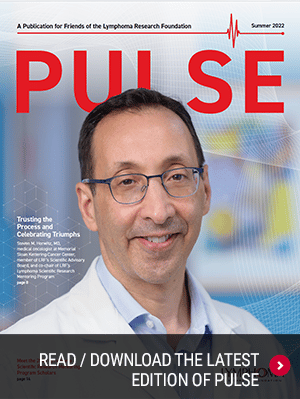Finding Light In the Middle of the Woods
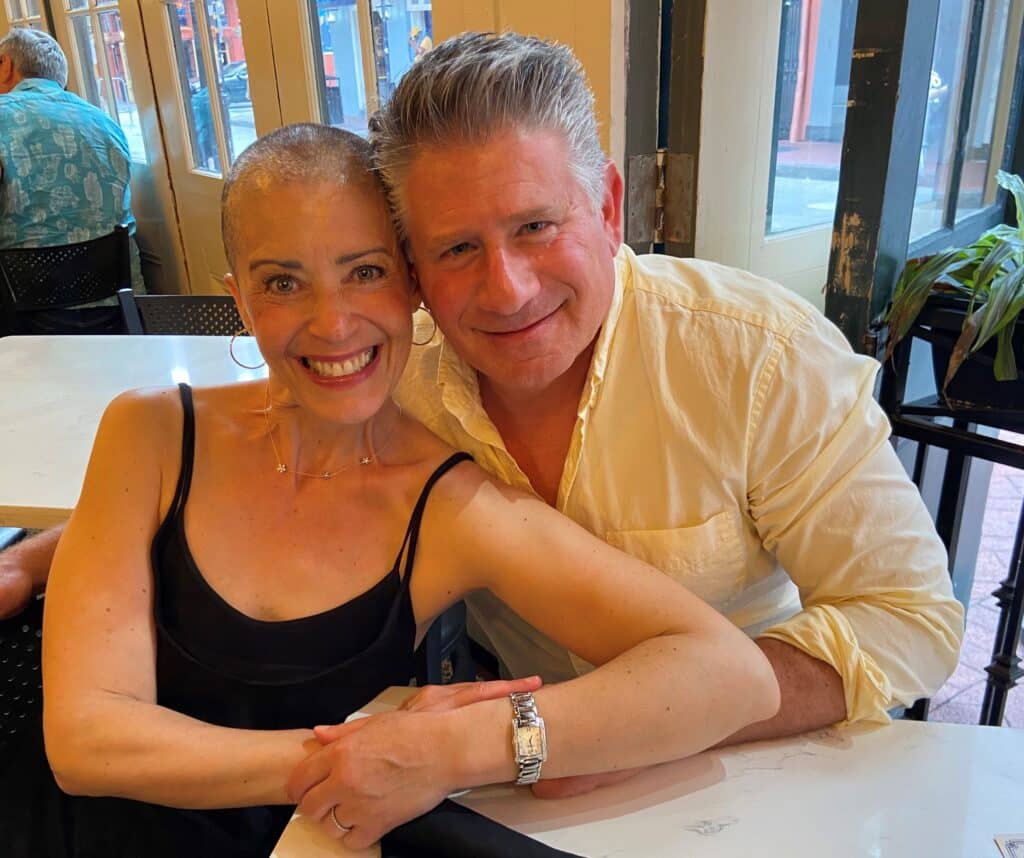
Ilyse Leibowitz always dreamed of having a second home in the Berkshires. A former elementary school teacher and certified yoga instructor with a deep connection to nature and spirituality, she calls the middle of the woods her “happy place.” It wasn’t until she found herself facing a lymphoma diagnosis that her dream of owning a house in the middle of the woods finally came true. While being a lymphoma survivor was never part of her original life plan, for Leibowitz and her husband of 30 years, Barry, and their daughters Lauren, 25, and Hannah, 23, their family’s lymphoma experience has been one of life’s unexpected blessings.
Leibowitz’s love of the outdoors and discipline as a high school and college track athlete kept her in excellent shape throughout her adult life. She saw her primary care doctor annually and was always “healthy as an ox.” Then things took a turn in 2017. Despite normal bloodwork, she knew something wasn’t right when a few itchy skin patches weren’t going away. For a year, she tried several natural remedies, including acupuncture, essential oils, cupping, and bleeding her ears, but her symptoms only got worse – as the cause continued to go undetected.
Leibowitz started experiencing night sweats but attributed them to being perimenopausal like many of her friends also in their late 40s. She also developed a bulge in her groin that she first thought was a hernia, though it wasn’t hurting like the three others she’d had before. It wasn’t until a surgeon biopsied the “hernia” in April 2018 that she was diagnosed with stage 4 non-Hodgkin T-cell lymphoma. Leibowitz passed out upon receiving the news.
“That was the only time in this whole process where I just let go. I couldn’t believe it,” she recalls. “It was like out of a movie. You don’t think it’s ever going to happen to you, especially when you take such good care of yourself.”
T-cell lymphomas are known for their heterogeneity, clinical complexity, and comparative rarity. It took a long time for Leibowitz to get an accurate diagnosis of Sézary syndrome, a subtype of cutaneous T-cell lymphoma (CTCL) characterized by the presence of lymphoma cells in the blood. Tests initially showed she had peripheral T-cell lymphoma (PTCL) because sometimes there can be a crossover between both types.
“I think that’s why it took so long for me to get the right kind of treatment, because the pathology showed peripheral T-cell and that is much more aggressive than cutaneous T-cell. So, they needed to go after that,” she says.
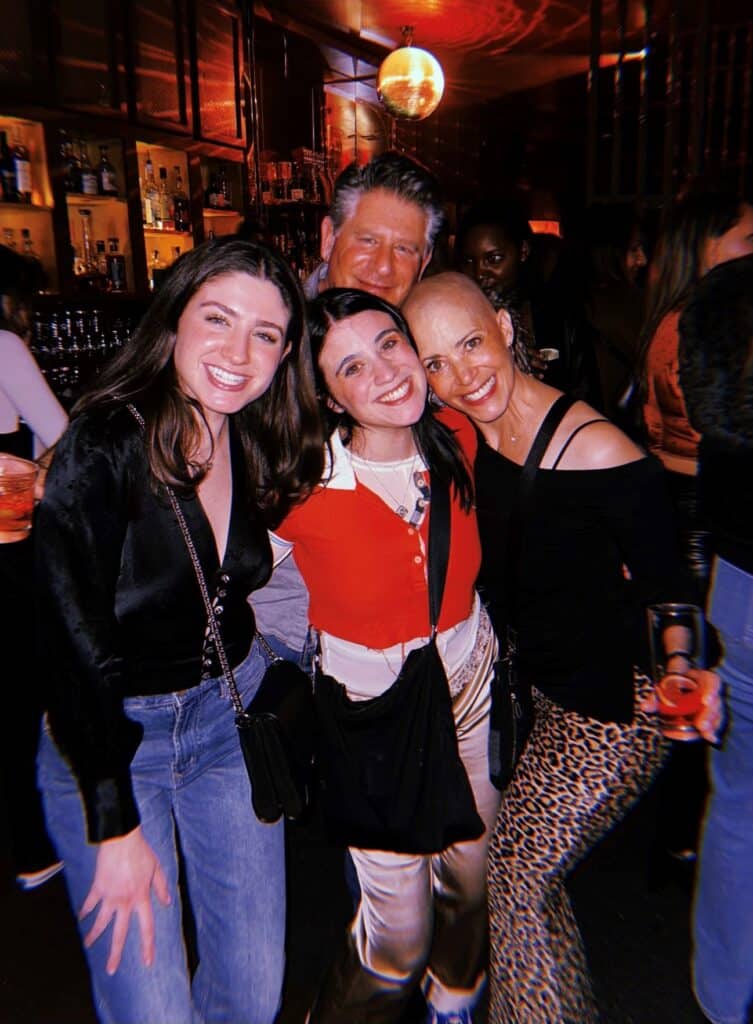
A Long Journey
Since beginning treatment two weeks after diagnosis, Leibowitz has followed seven different protocols in the last five years. She tried six different therapies that didn’t work, starting with five months of Romidepsin infusions once a week for six hours; four months of twice-daily photopheresis blood filtering two days in a row every other week; six rounds of chemotherapy once every three weeks; and three daily treatments of a different drug every three weeks. She also participated in a clinical trial for an oral drug being tested in T-cell lymphoma.
These treatments brought many challenges far beyond some of the uncomfortable side effects. There was enormous amounts of paperwork, exhausting travel back and forth from Long Island to Connecticut for her treatment at Yale, and the overall emotional toll of facing a diagnosis of cancer. Leibowitz kept herself in shape as best she could and leaned on the support of family and friends.
“I did a lot of sleeping, a lot of crying, a lot of praying, and had a lot of belief in myself,” she says. “I just never felt that my body was failing me, ever.”
She changed her eating habits, added supplements, and relied on acupuncture, massage, and physical therapy. Most importantly, she realized she couldn’t do it alone. “I had a lot of people helping me. It’s a multidimensional experience, and you need a multidisciplinary team to do it,” she says, adding, “I’ve learned I don’t have to be so tough. I don’t have to be in charge all the time. I can allow other people do some stuff for me. And it feels really good to receive.”
Leibowitz’s husband was her “rock” throughout this experience, staying by her side at nearly every doctor’s appointment. He was the one who pushed her into buying their summer home in the Berkshires in June 2020 while she was still in treatment. She recalls, “he said this is exactly the time that we’re going to do this, because we need something creative to focus our energy on. We need something happy that we’re going to look forward to and build together.”
Above all, Leibowitz found solace in her yoga practice. “Honestly, it saved me,” she confesses. Her yoga mentor and spiritual adviser helped her modify her practice to keep her moving at a gentler pace. The Leibowitzes even redid part of the basement in their new Berkshires house to be a “beautiful spiritual yoga space” where she could meditate and center herself throughout treatment.
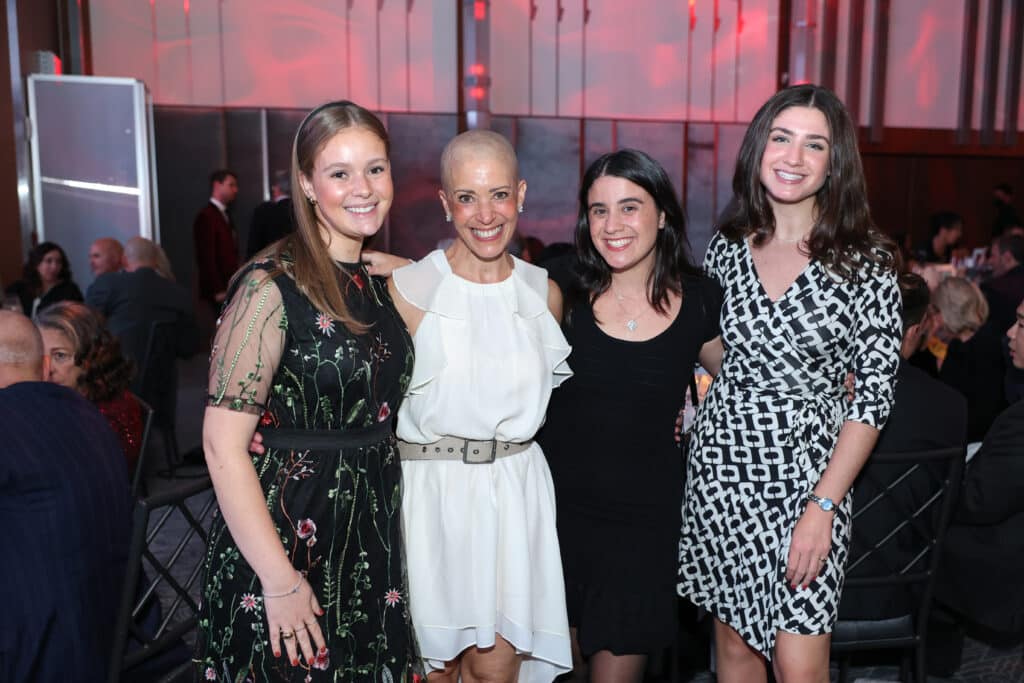
Turning a Corner
In October 2020, Leibowitz started her seventh treatment protocol – a monoclonal antibody that was not yet available when she was first diagnosed. Monoclonal antibodies are proteins made in a laboratory meant to stimulate your immune system. When taking this immunotherapy drug for the first time, she had a near death experience from a rare infusion reaction called tumor lysis syndrome, caused when cancer cells break apart in the blood and the debris toxifies your system.
Leaving the infusion center that day, Leibowitz was in so much pain that her husband had to reroute them to the nearest hospital as she screamed in agony. Within two hours of being hydrated by IVs, she was thankfully fine. Leibowitz thinks back on the experience as “horrifying but liberating.” “It changed my whole life for the better,” she muses. “I am so grateful that I had it and that it’s behind me, because it opened up my world in a way that I had been preparing for all these years.”
Despite a rocky start, this latest treatment has been “unbelievably effective” for Leibowitz. She started to turn a corner in January 2021 and has been in remission for two years, but since it’s such a new drug, her oncology team doesn’t yet know what maintenance or possible long-term effects look like.
For the first time in five years, Leibowitz is pausing treatment to prioritize healing from inflammation due to her treatment. Until now, she had been afraid to discontinue treatment, but she’s calmly taking this bump in the road as an opportunity to see what happens. “I’m optimistic,” she says. “I have an appointment coming up and I’m just meditating to the universe and calling it all in that I am good.”
Strength Through Hardship
As a survivor of chronic lymphoma, Leibowitz has accepted that her current treatment regimen will not work for her forever. But as she observes, “It’s never all in the past, even for the people that have a ‘cure.’”
Despite the hardship, lymphoma has taught both Leibowitz and her family a lot. As a Type A personality, she reflects on how she was “missing so much in the busyness of life” before her diagnosis. “I could cry from how great we are from all this,” she says when thinking about her experience now. “It’s like peeling the onion. It has just revealed the sweetness of all of us and what we can handle in life.” She adds, “I’d rather have a shorter
life living so awake and aware and alive. This was the vehicle for the unfolding, the dusting away.”
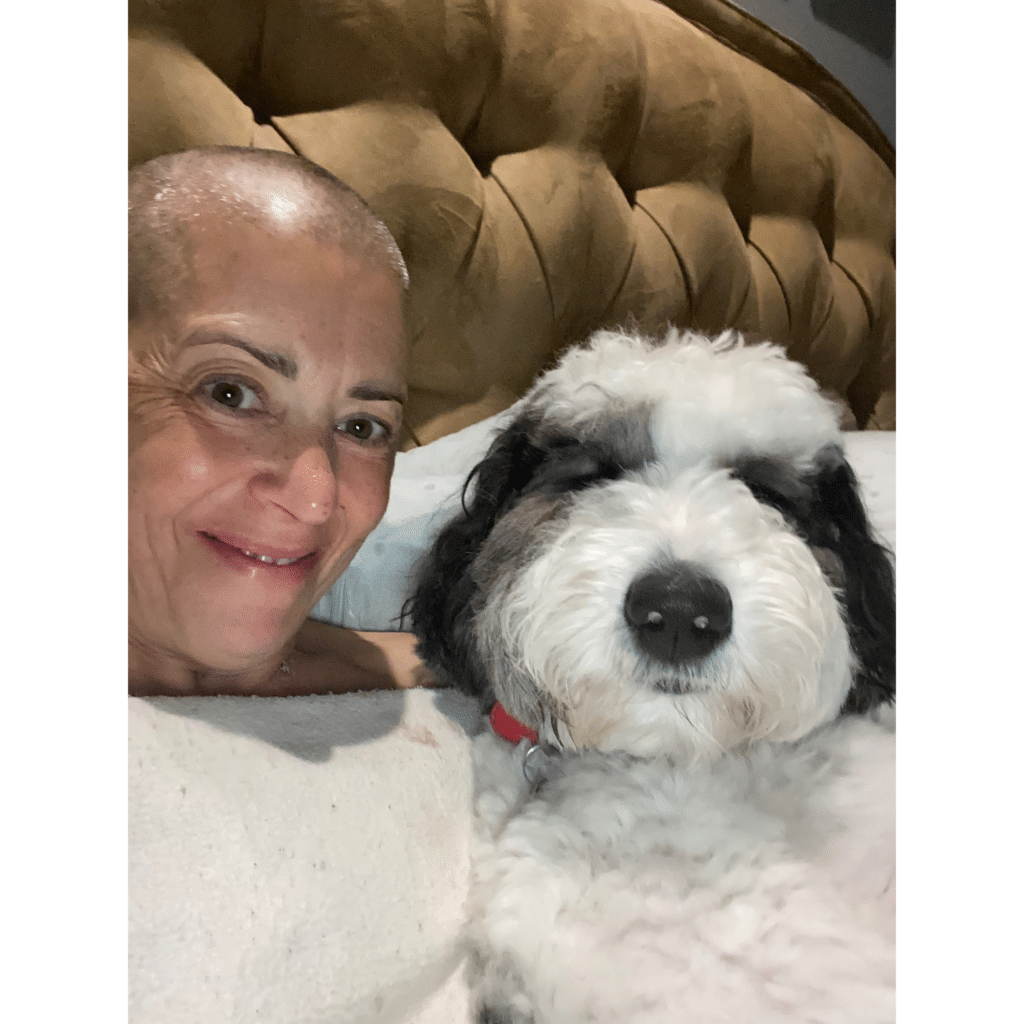
One “game changer” in Leibowitz’s journey has been a new addition to the family: a sheepadoodle puppy named Red. After their poodle passed away in January 2019, her husband promised they could get a puppy when the time was right. Opportunity struck about three years later when Leibowitz’s best friend asked if she would consider adopting sheepadoodle puppies together. Now, Leibowitz lights up when talking about snuggling and taking selfies with Red. “We call her the joy machine because everybody wants a piece of her because she’s so funny.” Red is currently in training for the Memorial Sloan Kettering Cancer Center Canine Cares program as part of Leibowitz’s eagerness to help others going through hospital care.
Finding and Spreading Hope
It was Leibowitz’s passion for yoga, teaching, and seeing the light in everything that first helped her to inspire other patients. Looking back on treatment, she says, “I was determined every single time I went in that I was going to find something that was magical about the day that I was connecting to because I wasn’t going to waste my experience. This is my life.” Doing yoga while hooked up to her IV and listening to music would often turn into Leibowitz leading the whole room in deep breathing exercises or dancing for fun. She once had the entire infusion center singing along to the Bee Gees’ “Stayin’ Alive.” “I make the best of things wherever I go,” she says.
Among the many resources she’s turned to for support, LRF stands out to Leibowitz for its “intimacy.” “The way that they share the information really shows you exactly what they’re working on. When you scroll through their website and see your subtype on the page, see the person who’s researching it – that makes me feel so, so hopeful.”
When Leibowitz’s current oncologist and LRF Scientific Advisory Board (SAB) member, Dr. Steven M. Horowitz, MD, of Memorial Sloan Kettering Cancer Center, approached her about serving on the benefit committee for last year’s Annual Gala, she jumped at the chance to get more involved. In addition to supporting and attending the Annual Gala, Leibowitz offered to give a spontaneous speech during the night’s event to help raise even more money toward the Foundation’s mission.
Leibowitz recalls how one of the most impactful videos she watched after being diagnosed was from LRF. From these videos to email updates on new drugs in the works, she is grateful for the support. “I’m learning so much about what’s ahead,” she says.
For Leibowitz, the years ahead are about “marinating in the delight of life.” In a message of hope to the lymphoma community, Leibowitz reiterates that “it’s so important that when you receive a diagnosis, you don’t let it define you.” She reflects on how the journey has helped her expand into her true self: “I’m having a cancer experience, but that’s not who I am. I’ve found myself. I am here, having a human experience to live out my purpose and my life and to enjoy and teach and learn and evolve.”
Read More Articles from Pulse
Pulse is a publication of the Lymphoma Research Foundation, providing the latest updates on the Foundation and its focus on lymphoma and chronic lymphocytic leukemia (CLL) research, awareness, and education

